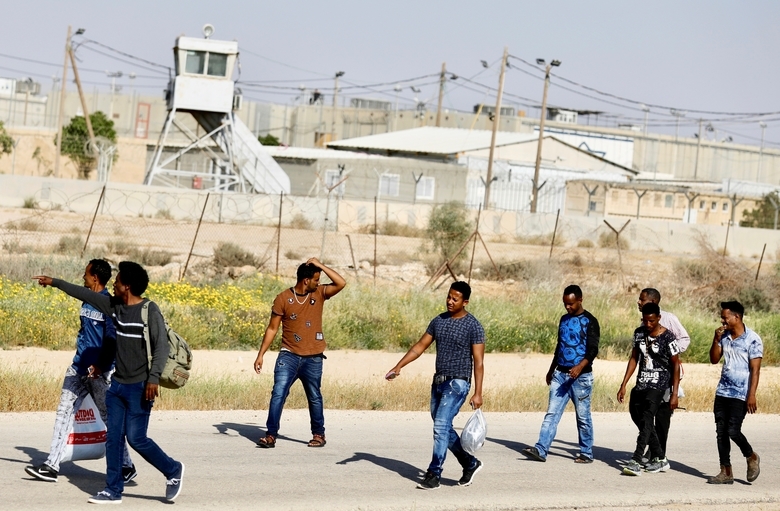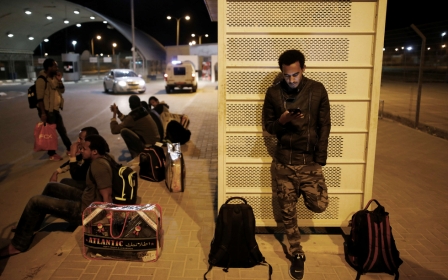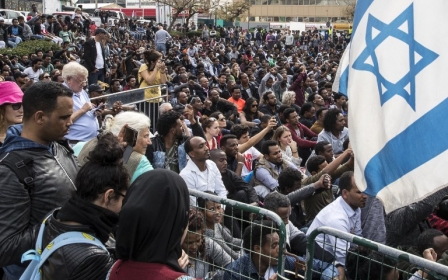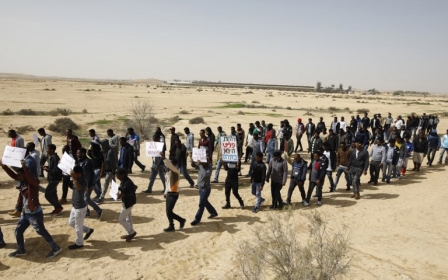Israel freeing 207 African migrants from prison

Israel on Sunday began freeing 207 African migrants from prison following a supreme court ruling after Prime Minister Benjamin Netanyahu controversially reversed a deal with the UN refugee agency on the detainees' fate.
By early evening, a spokeswoman for the immigration authority told AFP, about half had been released and the Israel Prisons Service said the operation should be completed by the end of the day.
There are about 42,000 African migrants in Israel. Authorities had transferred 207 from a nearby open detention facility in February after they refused to leave the country.
The Israeli government says the migrants in Israel are job seekers and that it has every right to protect its borders. The migrants and rights groups say they are seeking asylum and are fleeing war and persecution.
About 4,000 migrants have left Israel for Rwanda and Uganda since 2013 under a voluntary programme, but Netanyahu has come under pressure from his right-wing voter base to expel thousands more.
Israel's supreme court on 10 April gave the government until Sunday to finalise a deal it said it was working on to deport some of the migrants to another country.
Without the deal, the court said authorities must release those held at Saharonim Prison.
"In light of the fact that the negotiations between Israel and a third country are still ongoing and due to a supreme court ruling, the migrants held in Saharonim Prison will be freed today," the immigration authority said in a statement earlier.
Uganda said on 13 April it was "positively considering" the proposal from Israel to accept 500 of the mostly Eritrean and Sudanese migrants.
Earlier this month, Netanyahu cancelled an agreement with the United Nations refugee agency, UNHCR, aimed at avoiding forced deportations of thousands of migrants.
The reversal, just hours after Netanyahu announced the deal himself in a televised address, came after pressure from his right-wing base.
Rwanda will not participate
That left the government with its initial plan, announced in January, under which migrants who entered Israel illegally would face a choice between leaving voluntarily or facing indefinite imprisonment with eventual forced expulsion.
As the migrants could face danger or imprisonment if returned to their homelands, Israel had offered to relocate them to an unidentified African country - either Rwanda or Uganda, according to deportees and aid workers.
Rwanda has since said it could not be part of the arrangement.
The UN refugee agency has strongly criticised the deportation plan and urged Israel to return to the deal, which would have allowed thousands of migrants to remain in the country in return for an equal number being relocated to Western nations.
Some Israelis, including Holocaust survivors who say the country has a special duty to protect migrants, have also opposed the deportation plan.
Of the 42,000 African migrants in Israel, half are children, women or men with families who are not facing immediate deportation, according to interior ministry figures.
Migrants began entering Israel through what was then a porous Egyptian border in 2007. The border has since been strengthened, all but ending illegal crossings.
Middle East Eye propose une couverture et une analyse indépendantes et incomparables du Moyen-Orient, de l’Afrique du Nord et d’autres régions du monde. Pour en savoir plus sur la reprise de ce contenu et les frais qui s’appliquent, veuillez remplir ce formulaire [en anglais]. Pour en savoir plus sur MEE, cliquez ici [en anglais].




